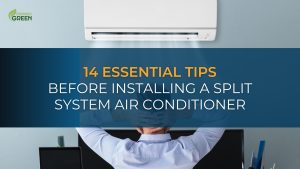Indoor air quality is as significant as the aesthetic appeal of our homes. Imagine walking into a beautifully designed room, only to be greeted by a musty odor or allergens that leave you with watery eyes and a runny nose. Not quite the welcoming space you envisioned, is it? Our heating and air conditioning systems significantly affect our overall health and well-being.
The quality of air in our indoor spaces is an aspect of our health that we can actively manage. By understanding the role of HVAC systems and taking steps to maintain and clean these systems, we can ensure cleaner air at home. If you’re aiming for improved health and well-being, read on to learn more about how HVAC systems impact air quality.
The Aspects of Indoor Air Quality

Initial Investment:
Indoor air quality (IAQ) is influenced by several factors, including humidity levels, temperature, and the presence of pollutants. Each of these elements plays a role in the quality of the air we breathe indoors.
Indoor Air Pollutants: These include mold, dust mites, pet dander, tobacco smoke, and VOCs emitted from household products. Each pollutant carries health risks, ranging from triggering allergies and asthma to causing serious conditions like heart disease and lung cancer.
Humidity: A certain level of humidity is necessary for our comfort and health, preventing dry skin and respiratory discomfort. However, excessive humidity can lead to the growth of mold and dust mites, common indoor air pollutants.
Temperature: Extremes of temperature can contribute to poor indoor air quality. High temperatures can increase the concentration of volatile organic compounds (VOCs), while cold temperatures can lead to increased humidity and mold growth. The WHO recommends a minimum indoor temperature of 18°C to prevent health risks.
The Advantages of Clean Indoor Air

Air quality doesn’t just enhance comfort; it has a direct bearing on our overall health. The benefits of clean indoor air extend from our physical well-being to our mental productivity.
Reduced Long-Term Health Risks: Maintaining clean indoor air can contribute to a lower risk of developing serious health conditions, including heart disease and cancer.
Improved Respiratory Health: Clean air means our lungs aren’t working overtime to filter out harmful particles, leading to fewer respiratory issues and a decreased risk of developing chronic lung diseases.
Allergy and Asthma Relief: By reducing indoor allergens like pet dander or dust mites, clean air can help minimize allergic reactions and asthma attacks.
Better Sleep: Sleeping in an environment with fewer pollutants can lead to more restful sleep and reduced sleep disruptions.
Increased Productivity: A Harvard University study found that people working in environments with better air quality showed increased cognitive function scores.
The Role of HVAC Systems in Indoor Air Quality

HVAC systems play a dual role in indoor air quality. They can help by filtering out pollutants and providing comfortable temperatures and humidity levels. However, if neglected, these systems can become a source of poor air quality.
Regular Maintenance: Without proper maintenance, HVAC systems can circulate dust and pollutants throughout the home, impairing indoor air quality. Regular cleaning and maintenance are key to preventing this scenario.
Filtering Pollutants: HVAC systems catch and trap pollutants—ranging from dirt and dust mites to mold spores and pet dander—before they can circulate around our homes.
Managing Temperature and Humidity: HVAC systems help maintain ideal humidity levels, inhibiting the growth of mold and mildew.
A Guide to DIY HVAC Cleaning and Maintenance

Maintaining your HVAC system is crucial for improving indoor air quality. Here are some tips:
Use Air Quality Monitoring: Invest in an air quality monitor to get a more in-depth understanding of your environment.
Change or Clean Filters: Replace or clean the filters at least every three months to prevent the accumulation of pollutants.
Check for Leaks: Inspect your HVAC system for leaks regularly to prevent moisture build-up and mold growth.
The Benefits of Professional HVAC Cleaning Services

While regular maintenance by homeowners is important, professional HVAC cleaning services offer a deeper clean that can drastically improve the system’s performance and your indoor air quality. Professional cleaners have the tools and expertise to clean hard-to-reach parts, effectively removing accumulated dust, mold, and bacteria.
Benefits of professional HVAC cleaning include:
- Improved System Performance: Increases efficiency and prolongs the lifespan of your system.
- Better Indoor Air Quality: Reduces the risk of allergies and respiratory issues.
Cost Savings: Saves money on energy bills and costly future repairs or replacements.
Other Tips for Improving Indoor Air Quality

In addition to maintaining your HVAC system, consider these strategies for a cleaner, healthier indoor environment:
Lifestyle Changes: Avoid chemical-based cleaning products and air fresheners, opting instead for natural alternatives.
Air Purifiers: Use air purifiers with HEPA or activated carbon filters to trap harmful pollutants.
Improve Ventilation: Regularly allow fresh air into your home and use exhaust fans in the kitchen and bathroom.
Choose A Clean HVAC System – Breathe Easier
Investing time, energy, and resources into maintaining good indoor air quality is not a luxury but a necessity. Inspired Green can help you ensure your HVAC systems are in top condition, improving your indoor air quality and health.









